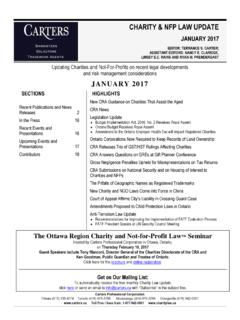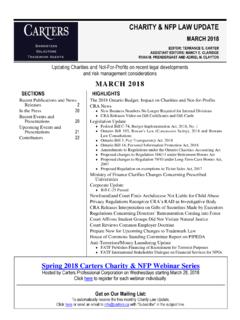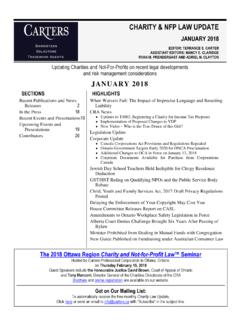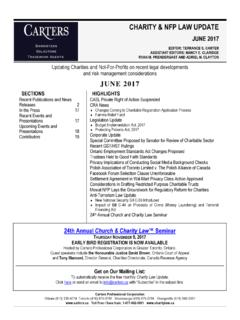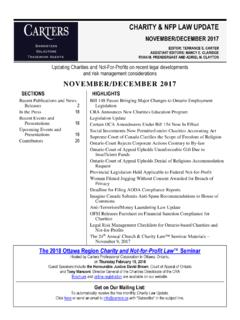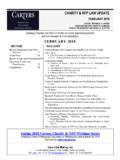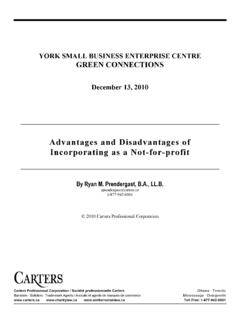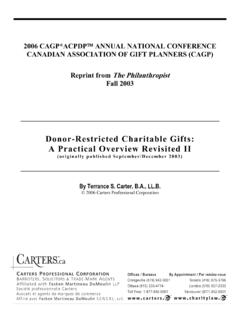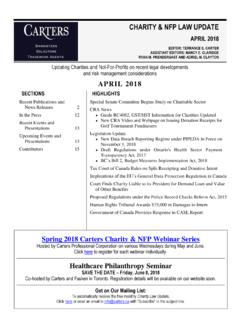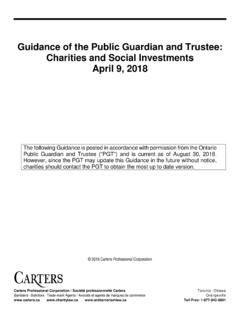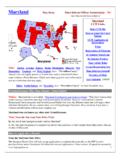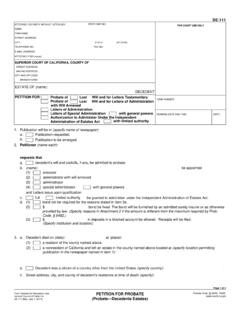Transcription of CHARITY & NFP LAW UPDATE - carters.ca
1 CHARITY & NFP LAW UPDATE SEPTEMBER 2019 EDITOR: TERRANCE S. CARTER ASSISTANT EDITORS: NANCY E. CLARIDGE, RYAN M. PRENDERGAST AND ADRIEL N. CLAYTON Updating Charities and Not-For-Profits on recent legal developments and risk management considerations S E P T E M B E R 2 0 19 SECTIONS HIGHLIGHTS Recent Publications and News Releases 2 In the Press 16 Recent Events and Presentations 17 Upcoming Events and Presentations 17 Contributors 18 Court of Appeal Holds Communications to Alter Grant is Lobbying CRA News OPC Concludes Consultation on Data Transfers Corporate UPDATE Federal Court Interprets Discipline Section of the CNCA Alberta Appeal Court Upholds Decision Denying Third Party Standing to Bring Court Application British Columbia Court Reinstates Membership in Procedural Fairness Case Legalization and Sale of Cannabis Edibles and Workplace Impairment Issues New Model Crowdfunding Legislation from the Uniform Law Conference of Canada Distinctiveness of Trademarks Anti-Terrorism/Money Laundering UPDATE Chambers and Partners Rankings 2020 Branding and Copyright for
2 Charities and Non-Profit Organizations, 3rd Edition 26th Annual Church & CHARITY Law Seminar Thursday November 7, 2019 Hosted by Carters Professional Corporation in Greater Toronto, Ontario. Details, brochure and registration are available online. Get on Our Mailing List: To automatically receive the free monthly CHARITY Law UPDATE , Click here or send an email to with Subscribe in the subject line. PAGE 2 OF 22 September 2019 RECENT PUBLICATIONS AND NEWS RELEASES Court of Appeal Holds Communications to Alter Grant is Lobbying By Ryan M. Prendergast In the case of R v Carson, released on May 15, 2019, the Court of Appeal for Ontario considered an appeal by the Crown of a summary conviction appeal in relation to offences under the federal Lobbying Act. The respondent, Mr. Carson, had been a federal employee in a position that qualified him as a designated public office holder under the Lobbying Act between 2006 and 2009.
3 On February 4, 2009, Mr. Carson left his government job and took a position as Executive Director of the Canada School of Energy and Environment ( CSEE ), at which time he became subject to a statutory five-year prohibition from carrying out lobbying activities pursuant to section of the Lobbying Act. As the CSEE is an organization for the purposes of the Act, section prohibited Mr. Carson from lobbying on behalf of the CSEE as an employee during the five-year period after the day on which he ceased to be a designated public office holder , including communicating with public officer holders regarding the awarding of any grant, contribution or other financial benefit by or on behalf of Her Majesty in right of Canada. In 2007, prior to Mr. Carson becoming the Executive Director, the CSEE had entered into an agreement with Industry Canada for a $15 million grant ( Funding Agreement ), which provided that the CSEE would commit the funds received by March 31, 2010, unless amendments and modifications were made in consultation with the Minister.
4 Otherwise, any unspent portion of the uncommitted amount would be returned to the Minister. In 2009, a public office holder from Industry Canada contacted Mr. Carson about potentially changing the Funding Agreement, as approximately $ million of the original grant was not likely to be committed by March 31, 2010. Over the next few months, Mr. Carson corresponded with various public office holders at Industry Canada about amending the Funding Agreement. This resulted in the parties entering into an amending agreement. Four years later, Mr. Carson was charged with three offences under the Lobbying Act, including a charge for as an employee of CSEE, undertak[ing] to communicate with public office holders in respect of the awarding of a grant, contribution or other financial benefit by or on behalf of Her Majesty in right of Canada. PAGE 3 OF 22 September 2019 The Summary Conviction Appeal Judge had set aside Mr. Carson s conviction, indicating that in certain circumstances, negotiating for extension of existing funding and for renewal of an agreement could become lobbying but that in these circumstances, Mr.
5 Carson had not been guilty of lobbying. However, the Court of Appeal disagreed, indicating that the Lobbying Act does not require a person to have instigated communications with a public office holder to be in breach of section Rather, to be in breach, a person is merely required to carry on any of the activities referred to in paragraph 7(1)(a), including communications in respect the awarding of any grant, contribution or other financial benefit by or on behalf of her Majesty in right of Canada. Additionally, the Court of Appeal noted that it was irrelevant that Industry Canada s officials did not consider Mr. Carson s conduct to be lobbying, and that it was for the courts to determine whether he had indeed conducted lobbying activities. Having reviewed the evidence, the Court of Appeal found that Mr. Carson had conducted lobbying activities by communicating with Industry Canada for the purpose of ensuring that the CSEE did not have to forfeit $ million, and that if successful, the result of his efforts would have constituted the award of a financial benefit.
6 It therefore allowed the Crown s appeal, set aside the Summary Conviction Appeal Judge s decision, and reinstated Mr. Carson s conviction. While this case is fact-specific, it is an important reminder to charities and not-for-profits of the importance of understanding whether their activities may be caught under applicable lobbying legislation. Although this case focuses on the five-year lobbying prohibition for an ex-public office holder, it was found, in the broader context, that communication with public office holders to alter the terms of a grant was considered lobbying. However, this does not mean that every CHARITY that engages with the federal government concerning the awarding of a grant or negotiating the renewal of a grant needs to register for the purposes of the Lobbying Act, as the balance of the requirements to register needs to be taken into consideration based upon their specific facts.
7 With the introduction of public policy dialogue and development activities ( PPDDAs ) under the Income Tax Act, as discussed in CHARITY & NFP Law Bulletin No. 453, PPDDAs may include lobbying activities as defined in federal and provincial lobbying legislation. In this regard, when engaging with public office holders, charities should therefore be aware of their activities and the reporting requirements that may be imposed on them as a result of those activities. PAGE 4 OF 22 September 2019 CRA News By Theresa Man Application Form T2050 to be Phased Out As part of the Canada Revenue Agency s ( CRA ) rollout of the Charities IT Modernization Project (CHAMP) under way since June 1, 2019, the CRA implemented a new online application for charitable status through the CRA s My Business Account ( MyBA ). During the early days of implementation of the online application process, the CRA has been continuing to accept applications using Form T2050, Application to Register a CHARITY Under the Income Tax Act.
8 However, the CRA will no longer accept the T2050 Form after September 30, 2019. There are differences in the questions contained in the online application form and the T2050 Form. Those who do not wish to use the online application may obtain from the CRA a paper form of the application (Form T1789). To assist with filing applications online, the CRA has recently added more information on the CRA s MyBA webpage and has posted a webpage to guide applicants through the application process. The information includes directions on setting up MyBA, as well as tips about the online application form and tips to avoid delays. For example, to guide applicants, the CRA notes that applicants will need to provide detailed information for each charitable activity, either currently carried out or proposed to be carried out. It further indicates that multiple individuals can take turns logging in to complete different sections of the form.
9 Further, once an application has been submitted, applicants will be able to log into MyBA to review their application status. Applicants should also be aware that the online application has not been updated to reflect the new PPDDA regime that replaced the previous political activities regime under the Income Tax Act. In this regard, the CRA has indicated that the online application will be revised to reflect the new rules in November 2019. Prior to this, applicants will need to follow the CRA s instructions on the CRA s webpage on how to complete the application as if it concerned PPDDAs rather than political activities, rather than following the wording in the online application itself. PAGE 5 OF 22 September 2019 OPC Concludes Consultation on Data Transfers By Esther Shainblum On September 23, 2019, the Office of the Privacy Commissioner of Canada ( OPC ) announced that it had concluded its consultation on data transfers of personal information for processing ( Consultation ).
10 As was discussed in the June 2019 CHARITY & NFP Law UPDATE , the Consultation was originally launched on April 9, 2019 alongside the OPC s Equifax Report of Findings, and was reframed on June 11, 2019. In the Equifax Report of Findings, the OPC had strayed from its longstanding position on transfers of personal information for processing, characterizing them as disclosures of personal information, rather than use , within the meaning of the Personal Information Protection and Electronic Documents Act ( PIPEDA ), and therefore requiring consent. However, the OPC has now concluded that its position under the current law, as outlined in the January 2009 Guidelines for processing personal data across borders, will remain unchanged and that consent will not be required in such instances. In coming to this conclusion, the OPC took into consideration the 87 submissions it had received, including the Canadian Bar Association s submission discussed in the August 2019 CHARITY & NFP Law UPDATE .
